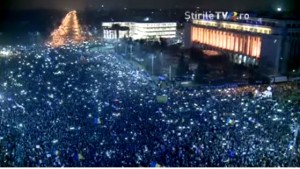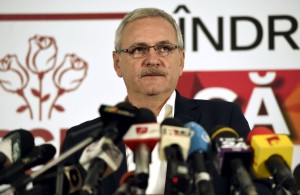:quality(80)/business-review.eu/wp-content/uploads/2012/12/cover1.jpg)
The massive street protests that have been recorded in Romania in the past week has also represented a reason for some politicians from the Social Democratic Party (PSD) to claim that multinationals should be investigated, citing several media reports that have been debunked as fake news.
What we know is that some employees of multinational firms in Romania, most of them from the young generation, took part in the peaceful protests that were staged in the country and abroad. But they were joined by seniors, entrepreneurs, students and even public sector employees.
However, the allegations of some representatives of the left-wing party PSD intensified after the head of Raiffeisen Bank, Steven van Groningen, was spotted at one of the protests that was taking place near the government building. The executive explained why he took part in the protests on several nights.
How the large companies were dragged in the political conflict
Journalist Cristian Pantazi explained in an editorial on HotNews.ro that the main sources invoked by politicians from the ruling coalition in their comments about multinationals and protests were based on shady media sources.
For instance, business publication Capital.ro apologized after posting an article which claimed that “Large companies ask their employees to protest against Dragnea (Liviu Dragnea, PSD president – e.n) and Trump (Donald Trump, US president – e.n.)”. The piece was later deleted and the publication apologized, but the article had already been promoted on certain TV news stations.

In another article, whose author is not made public, multinationals are accused of attempts to topple the current government because PM Sorin Grindeanu was planning to amend the Fiscal Code and increase the tax burden for these companies. The web domain where the piece was published uses the name of Dan Andronic, the owner of Evenimentul Zilei and Capital publications. Andronic claimed that he doesn’t have any kind of links to this website.
In a separate article published in the local press, Japanese car parts maker Yazaki was accused of “forcing” its employees to take part in the street protests against the government. The management of the company rejected the allegations, adding that Yazaki is manufacturing auto cables in Romania and is not involved in any kind of political actions. This article was published by PH-online.ro, which is close to the PSD leadership in Prahova county, according to HotNews.ro.
MP calls for investigation of alleged link between multinationals and protests
Although these pieces have been debunked as containing false information or being simply fake, social democratic MP Adrian Tutuianu invoked these three articles when he said that the domestic intelligence service SRI should investigate if the employees of the multinational firms were sent to protest against the government.
On February 4, Tutuianu, who heads in Parliament the committee for the control of SRI, said that this is something that should be investigated “in the interest of national security”.

But, there was a local PSD leader who claimed that the political party should not attack these firms, which support the economy and give jobs.
“Yes, some companies in Romania that were somewhat impacted (by these attacks – e.n) in their efforts of contributing to the economic growth of this state have to receive public apologies,” said Mihai Chirica, the social democrat mayor of Iasi city.
Recently, the main business associations in Romania, including AmCham Romania and the Foreign Investors Council (FIC), issued warnings that the country’s economic climate could suffer if the government approves controversial amendments to the Criminal Code.
These associations, which represent the largest foreign investors in the country, had warned that such decision, taken without clear consultations with all stakeholders, would harm Romania’s anti-corruption efforts.
And the same message was put out by foreign embassies, the representatives of the European Union and the United States of America, by president Klaus Iohannis and the opposition parties in Romania.
Dragnea’s fiscal policy principles, linked to activity of multinationals
The head of the PSD sold the fiscal policy of his party on the idea that the large foreign companies were getting additional benefits in Romania. For instance, he said that he would carefully look to see if the oil companies would lower prices after the extra-fuel excise was dropped earlier this year. He would say the same about companies in the telecom and energy sectors following the elimination of the special construction tax.

In late 2016, Dragnea sold his draft bill on eliminating the mandatory public TV-radio contribution on the idea that in this way, the foreign utilities would not get a commission any more for collecting this tax in the name of the state. Meanwhile, the mandatory contribution was scrapped.
Some voices close to the PSD, from the business side, also went to the media in the past years, claiming that the Romanian entrepreneurs were the targets of anti-graft prosecutors, while the foreign executives were not investigated at all. This idea was championed by former MP Sebastian Ghita, the founder of an IT empire, who is currently prosecuted for corruption. Ghita, a former PSD MP, is on the fugitives list of Europol.
Ovidiu Posirca (ovidiu.posirca@business-review.ro)



:quality(80)/business-review.eu/wp-content/uploads/2024/04/Offline-vs.-Online-Wallet-Apps.jpg)




:quality(80)/business-review.eu/wp-content/uploads/2024/02/IMG_6951.jpg)

:quality(80)/business-review.eu/wp-content/uploads/2024/04/COVER-1.jpg)



:quality(80)/business-review.eu/wp-content/uploads/2024/04/cover-april.jpg)
:quality(50)/business-review.eu/wp-content/uploads/2024/04/Rafaela-Nebreda-fondator-Imoteca.jpg)
:quality(50)/business-review.eu/wp-content/uploads/2024/04/Slide1.png)
:quality(50)/business-review.eu/wp-content/uploads/2024/04/1_Transport.jpg)